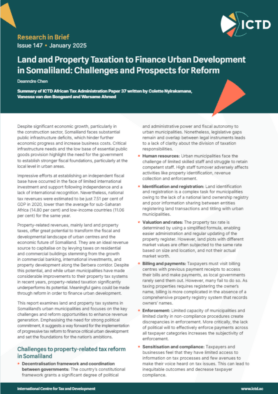Research in Brief 147
Despite significant economic growth, particularly in the construction sector, Somaliland faces substantial public infrastructure deficits, which hinder further economic progress and increase business costs. Critical infrastructure needs and the low base of essential public goods provision highlight the need for the government to establish stronger fiscal foundations, particularly at the local level in urban areas. Impressive efforts at establishing an independent fiscal base have occurred in the face of limited international investment and support following independence and a lack of international recognition. Nevertheless, national tax revenues were estimated to be just 7.51 per cent of GDP in 2020, lower than the average for sub-Saharan Africa (14.80 per cent) and low-income countries (11.06 per cent) for the same year.
Property-related revenues, mainly land and property taxes, offer great potential to transform the fiscal and developmental landscape of urban centres and the economic future of Somaliland. They are an ideal revenue source to capitalise on by levying taxes on residential and commercial buildings stemming from the growth in commercial banking, international investments, and property development along the Berbera corridor. Despite this potential, and while urban municipalities have made considerable improvements to their property tax systems in recent years, property-related taxation significantly underperforms its potential. Meaningful gains could be made through reform in order to finance urban development.
This report examines land and property tax systems in Somaliland’s urban municipalities and focuses on the key challenges and reform opportunities to enhance revenue generation. Emphasising the need for strong political commitment, it suggests a way forward for the implementation of progressive tax reform to finance critical urban development and set the foundations for the nation’s ambitions.
Summary of ICTD African Tax Administration Paper 37.

